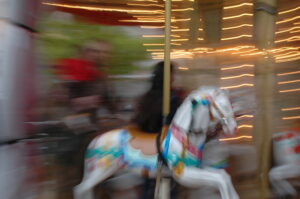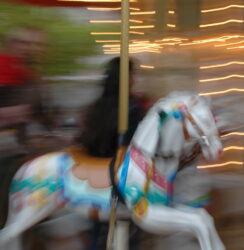The Story of the Red Bear
Many years ago, at a flea market on the parking lot of a seedy pizzeria next to the highway, my daughter (let’s call her Thalia) found and fell in love with a little bear dressed like Santa Claus. She called it Rotbär, red bear, and pronounced it hohtbär (with long dark “O” as in home), because her mouth was still learning those harder, guttural letters. It became her one and only faithful companion, support, savior, friend.
A few months later, disaster struck. On a cold November night, Rotbär got lost somewhere in Basel. Exactly how is anyone’s guess. We searched for it high and low, made calls, returned to each location we might have been. To no avail. Thalia’s gentle heart, at three and a half years of age, had experienced its first great tragedy, and she was inconsolable. And my heart reached out and tried to pick up the pieces of hers and patch them together.

“Rotbär has certainly gone on vacation for a while,” I told her, explaining, with as much empiricism in my voice as possible, that even bears like to take a break. Winter was on its way, dark, cold, and austere, and he had surely caught a southbound train, to Ticino, to Italy, Spain, later Africa… He wanted to see the world, he would be back, just be patient. In our minds, mine adult and hers basking in the great universe where fantasy reigns, this was all possible and perfectly logical.
It worked. For a while at least. The world is a big place. I had a map in my mind, and it all made perfect sense. I hoped she would slowly find a new creature to love, or be distracted by the weekly steps a child’s soul makes, but that is not Thalia. Every now and then, she would burst out in tears and say, “Hohtbär is surely, surely lost forever, why would he want to leave?”
This went on for two-and-a-half years, or thereabouts. She did not forget the little bear dressed like Santa Claus. In the meantime, she even pronounced him “rrrotbär,” rolling the “R”s properly. “He probably found a wonderful place to live for a while,” I told her, “and I am sure he is happy, he must be,” I spoke with genuine sincerity driven by my own emotion.
This worked, too. At least for another while.
But soon after, one quiet night, my usual lucubration was interrupted by a plaintive cry: “Papa, I wonder where Rotbär is right now, I am sure he was stolen by pirates,” and the tears flowed and flowed and flowed, and I felt my own welling up. And so, the story of the traveling red Santa Bear expanded, my imagination driven by the need to console this child. The journey became decorated with touches of real life, train rides, plane trips, seasickness on ships, and joyrides in cars, visits to poor children in faraway lands, who really needed to be comforted by the Miracle Bear, because they had so, so little, and we had so, so much. And Thalia’s little-giant heart of gold, overflowing with a sense of justice, felt this was right and Rotbär was doing fine. So, it worked. For another while. Say a month or two, maximum.
But miracles do happen when we love. And so, one day, I was happy to report that Rotbär had finally phoned me. From England, of all places. It came as a surprise, of course and raised hopes I could not dash.
He told me — so I reported — that he had decided to come back home because he missed Thalia. She was excited. “Really???” Yes, really, I answered, and mentioned in passing that he had probably changed a bit, just like she had changed in all those years. She had become bigger, her language was now almost perfect, and he had been traveling, after all, and had lived rough occasionally. But apparently he still had those clothes on. “He told me he would send a postcard from Hamburg,” I dropped, casually, at the table one day.
I knew other key parts of Rotbär that had “changed,” but I could not tell her. In fact, I will take this secret with me to the next world.
Lo and behold, a few days later a picture came in an envelope – today we’d say a selfie – addressed in heavy, cumbersome letters: A little bear in a Santa suit, looking cocky indeed, and, oddly, sitting on a chair just like the one in our living room. He was obviously somewhere where people also did sporadic shopping at a Swedish furniture outlet. I placed the picture on the kitchen table. At mealtimes, Thalia would look at that bear, and could hardly believe it. Rotbär was really, really coming home. And it must be that bear, she vaguely remembered. He was in Hamburg (“Is that far?”), he is in Hanover (“Is that far?”), he is in Düsseldorf (“Is that far?”), he is taking a ship down the Rhein to Karlsruhe (“Is that far?”), which flowed just a few miles from where we lived. We scrutinized the map of Germany. Once she even asked if he was in Alsace, across the border. “No,” I replied earnestly, “The train line from Hamburg comes through Freiburg, not Alsace…
You have to be realistic, right?
Then came her sixth birthday, on a bright July day. She was having seven friends over. The heat was excruciating. In the afternoon, just as the party was setting off for a treasure hunt (accompanied by our flesh-and-bone cat), after the cake-eating ceremony, heavy storm clouds suddenly stacked up in the sky, menacingly. But they only broke to the north and east of the district, causing floods and all manner of havoc. We just got the dark clouds and wind and a few drops of rain. So, the children could play outside for a while and dip in the inflatable pool and scream.
Thalia was in seventh heaven. Especially since there was one prodigal guest at the festivities.
This is what had happened earlier in the day:
She had woken up to a festively decorated apartment, with garlands strung from the beams and pink vinyl cloth on a table decked out with fairy cups and princess plates. Suddenly, at 8:20 a.m., the doorbell rang perfunctorily. She ran down the stairs, imagining some present or some well-wishers to be there. On the table in front of the entrance door sat none other than Rotbär, back after so, so many adventures. Exactly, the same as on the postcard. Except in his backpack were some gummi bears. Well, what do bears snack on while traveling?
What a miracle day. It was twelve long hours of fun and games and cake …
Sun was setting, the guests all went home. The day turned to a dusky evening. Before going to bed, Thalia’s front tooth, which had been very wiggly, finally came out. The tooth fairy would be along as soon as everyone was asleep to round off this magical, oh-so-magical day. Thalia went to bed, undressed Rotbär, because it is still quite hot out, she pointed out.
Cooler night hours make work easier in summer. I sat down at my desk. And then, after some time of silence, her voice, with those familiar dissonant notes of distress, tore through the now quiet flat. “Papa!” I rise from my desk and amble to her room. “The guests,” – she really called her friends guests – “they said that someone brought Rotbär, he didn’t come by himself.” It’s night now, and the time when our inner voices are often loudest, tiny doubts become raging wolverines eating up our sleep.
Somehow, I had expected this. Or rather, I feared this. The crushing comments of children raised in convenient empiricism…. Like those fragile, pearly little teeth giving way to more stable eating tools, her childhood was ebbing, and with it a power that can truly move mountains. The dreams, the fantasies, were ceding to reason and logic. She knew it. She was proud of those new teeth. Her friends all had Halloween pumpkin smiles already and boasted about it among themselves.
What can we do? We want our children to grow into free and bright individuals. And we want them to keep that secret power of childhood at the same time.
I told her simply they had no idea what they were talking about, and maybe they, too, wanted a magical bear as a friend.
She tearfully, desperately, explained that she had really liked being five years old, and did not want to be six. She couldn’t explain why, but having to go to school suddenly seemed too daunting. “Five is a good age!” she threw at me. I could feel the gate to the Garden if Eden was opening. But we chatted about age, about being six, and fifty-three, and how old grandpa is (seventy-seven) and about why Joni, our neighbor in Hungary, died two years ago at around eighty.
Child that she was, Thalia had few filters. She listened with each cell to what life was telling her and it became experience. In a few years, no time really, she would be a different person, I knew that. What lesson was there here? Should one obey the harsh laws of 2+2 = 4 and nothing more? Was this a manipulative charade I was playing with her? Would the disappointment be even greater later on? Or was I simply trying to nurture happiness?
I believe in authentic emotion, in sadness, and anger, and joy. We avoid pain, but our wounds are where the light enters, said Rumi. There is so much to say for feeling and expressing our deepest selves. The mind debates the heart, but all its victories are Pyrrhic, because the heart is stronger and will rebel, slip out of the cage of reason, and set fires if it must. Our emotions, and hence our imagination, are what make us whole and real and able to truly communicate in the end. Her feelings, I suddenly realized, had nothing to do with a little bear in a Santa suit.
“You always knew Rotbär was coming back, didn’t you?” I asked.
“Yes!”
“You believed he would? Truly, in your heart?”
“Yes!”
“Because you really love Rotbär, right?”
“Yes!”
“Well, your friends were not here this morning when the doorbell rang, so they don’t know. He’s here, and that is because you believed it would happen.” This I say in a voice of conviction.
“Yes, and he came back to be with me.”
“Of course,” I answer,” what more do you need to know? Good night, sleep tight…”
“… and don’t let the bedbugs bite” she finishes off.
She fell asleep in minutes, clutching Rotbär. Her dream was still intact, she had all the time in the world to do the growing up bit. She knew a lot anyway, even how to move chess pieces on a board, so I was not worried.
I watched her body breathing quietly, and I keep thinking that it’s true, she actually willed that Rotbär back in some way. She never deviated from the faith in what I, her father, kept telling her. But it was her faith, her energy, her focus on the dream that did it. The bear was traveling and traveling and enjoying himself and having so many adventures, and she was with him.
This is the genuine power that children have. It’s so unbelievably pure, so surgically precise and in some ways devastating. In the dark room, it took my breath away and released tears of wonder and longing: to be suddenly bathed in this electrifying power of dreams, to feel free of the narrow protective armor needed to survive the daily grind with its inevitable skirmishes, to just, for a moment, feel the immensity of imagination and the full force of its impact. She breathed life into any object. This is true strength. This must be protected and nurtured at all cost. Not only in our children, but in our own child that we once were.
The house is quiet. I walk back to my desk. Time to get back to work.
Note: I published this story a while ago on an old blog. It is personal, and because the Internet is what it is, and I wished to protect my daughter from exposure to harassment for being a brilliant, well-balanced, dreamy individual, I took it down and replaced it with this. The Internet, for all its benefits, has since been conquered by data-mining feudal lords. It has invaded our erstwhile private spaces and co-opted and stolen our ability to dialogue, our epistemic stability, our focus on important things, our peace of mind, and, worse, the final frontier: our time. This story took place just before that time).
[sibwp_form id=1]




